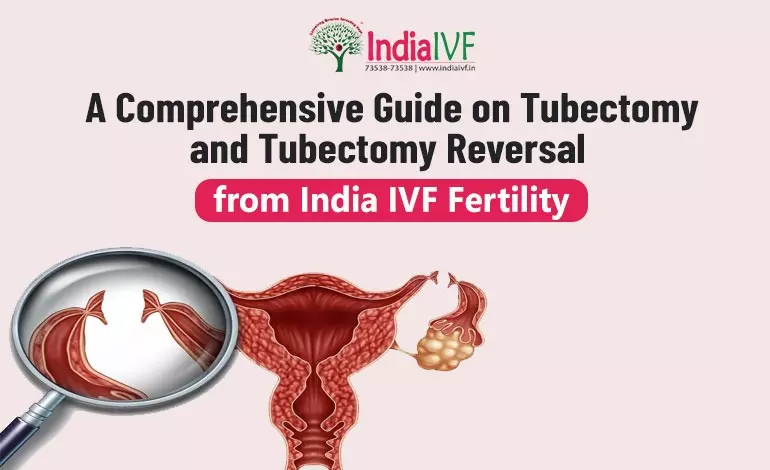Your cart is currently empty!



The journey to parenthood sometimes takes unexpected turns. Maybe you decided early on that you didn’t want to have children, so you had a tubectomy. But now, the times have changed, and so have your aspirations. At India IVF Fertility, we believe that everyone should have the chance to become a parent, no matter what obstacles they have faced in the past. This comprehensive guide will explore tubectomy and tubectomy reversal, providing you with essential information to help you decide if this procedure is right for you.
The joys of parenthood are just one decision away. Discover the journey of Tubectomy and its reversal to unlock the door to new beginnings.
Tubectomy, commonly known as tubal ligation, is a surgical procedure used to prevent pregnancies in women. It’s often referred to as “getting your tubes tied”. It involves blocking or sealing the fallopian tubes, which carry eggs from the ovaries to the uterus.
Women opt for tubectomy for various reasons, such as:
Tubectomy reversal, also known as tubal ligation reversal, is a surgical procedure that can restore fertility after a tubectomy. It involves re-opening, untieing, or reconnecting the fallopian tubes to allow eggs to travel to the uterus again.
Common reasons women choose tubectomy reversal include:
Not all women are eligible for a tubectomy reversal. Here’s who can consider this procedure:
While there’s no strict age limit for tubectomy reversal, the age of the woman can impact the success of the surgery and subsequent pregnancy. Women under 40 years have higher success rates.
Preparing for a tubectomy reversal isn’t just about the physical aspect, but also understanding the emotional and financial implications.
Before the surgery, your healthcare provider will conduct a thorough medical evaluation. This might include blood tests, pelvic examination, and imaging tests.
To prepare for tubectomy reversal:
This section details the tubectomy reversal procedure, which is typically performed by an experienced surgeon who specializes in reproductive or pelvic surgery.
The surgeon will use microsurgical techniques to reconnect the fallopian tubes.
Tubectomy reversal is generally done under general anesthesia.
After surgery, you’ll need some time to recover.
Recovery time varies from person to person, but most women can return to normal activities within 1-2 weeks.
After the procedure, it’s important to follow your doctor’s advice and take care of your health to ensure a smooth recovery.
You can start trying to get pregnant as soon as you feel ready, typically after a month or so.
Factors such as age, overall health, and the condition of your fallopian tubes can affect conception after tubectomy reversal.
Success rates vary widely and depend on individual circumstances.
General success rates range from 40-85%.
Age, type of tubectomy, overall health, and the experience of the surgeon all play a role in the success of the procedure.
Like any surgical procedure, tubectomy reversal has potential risks.
These include infection, bleeding, and damage to the surrounding organs.
Long-term risks include ectopic pregnancy (where the fertilized egg implants outside the uterus, usually in the fallopian tube).
There are many advantages to considering a tubal ligation reversal.
The biggest benefit is the possibility of becoming pregnant naturally.
Compared to other fertility treatments, tubal ligation reversal is less complex and generally less expensive.
Like any surgery, some discomfort is expected in the initial recovery period. However, pain can be managed with medications.
The cost of the procedure can vary depending on various factors.
Factors include the hospital chosen, the surgeon’s experience, and geographical location.
Yes, but success rates are lower due to decreased fertility with age.
Success rates are generally lower for women over 40.
Older patients should consider their overall health and the potential risks of pregnancy at an older age.
If tubectomy reversal isn’t an option, there are other ways to become a parent.
IVF is a common alternative that involves fertilizing an egg outside the body and then implanting it in the uterus.
Adoption is another beautiful way to become a parent.
Tubectomy reversal offers a second chance at parenthood for those who have undergone a tubectomy. However, it’s a personal decision that should be made after thorough consideration and discussions with a healthcare professional.
Tubectomy is a surgical procedure to prevent pregnancies in women, often referred to as "getting your tubes tied".
Tubectomy reversal is a surgical procedure that can restore fertility after a tubectomy by re-opening, untieing, or reconnecting the fallopian tubes.
Women who have had a tubectomy and now want to conceive, are in good overall health, and have a sufficient amount of healthy fallopian tube left are eligible for a tubectomy reversal.
The success rate varies widely and depends on individual circumstances, ranging from 40-85%.
The risks include surgical risks such as infection and bleeding, and long-term risks such as ectopic pregnancy.
Like any surgery, some discomfort is expected in the initial recovery period. However, pain can be managed with medications.
The cost of the procedure can vary depending on the hospital, the surgeon's experience, and geographical location.
Yes, but the success rates are generally lower due to decreased fertility with age.
Alternatives to tubectomy reversal include In-vitro Fertilization (IVF) and adoption.
You can start trying to get pregnant as soon as you feel ready, typically after a month or so.
At India IVF Clinics we provide the most comprehensive range of services to cover all the requirements at a Fertility clinic including in-house lab, consultations & treatments.